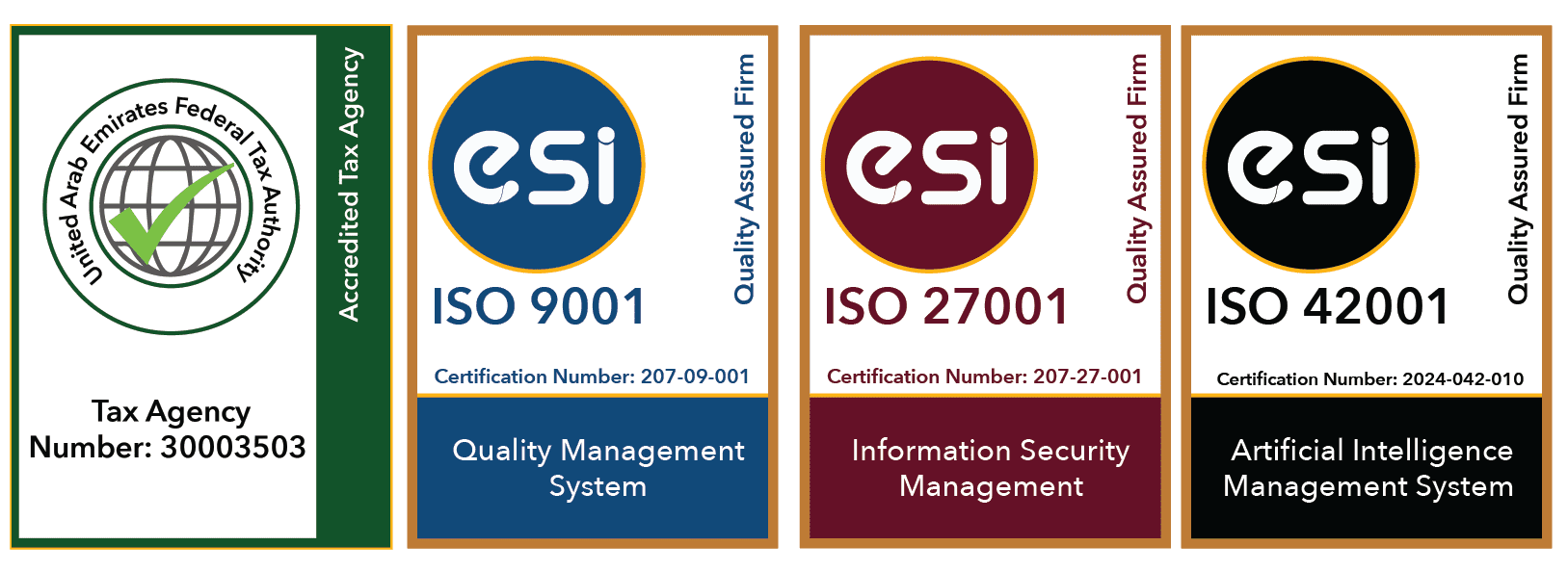Important Amendments to UAE Economic Substance Regulations
Oct 7th 2020 / Haroon Juma / Economic Substance Regulation

Background
On 10 August 2020, the UAE Cabinet of Ministers issued Cabinet Resolution No. 57 of 2020 (the “amended ESR”) which replaces the original Economic Substance Regulations UAE, along with updated Guidance clarifying the amended Economic Substance Regulations (Ministerial Decision 100 of 2020 dated 19 August 2020).
The amendments to the Economic Substance Regulations UAE and Guidance provide welcome changes and additional clarity that should help reduce the overall burden on businesses in the UAE.
These changes include
- to the definition of “Licensee”,
- the introduction of some additional categories of exempted Licensees,
- clarifications regarding the treatment of branches
The UAE introduced economic substance requirements for certain businesses on 30 April 2019 through the Cabinet of Ministers Resolution No.31 of 2019 on Economic Substance Regulations (“the original ESR”). Further guidance on the application of the original Economic Substance Regulations UAE was issued on 11 September 2019 pursuant to Ministerial Decision No. 215 of 2019 (“Guidance”).
In addition, the UAE MoF has updated the information on its economic substance website (link here).
The amended Economic Substance Regulations UAE apply from 1 January 2019 detailing important changes to the scope and administration of the economic substance regime in the UAE, which are set out below:
Critical changes in the amended ES Regulations
The amended Economic Substance Regulations UAE introduce a few important changes:
Definition of a “Licensee”
The amended Economic Substance Regulations UAE only apply to:
- juridical persons (persons with separate legal personality)
- and unincorporated partnerships that carry on a relevant activity in the UAE.
- Natural persons, sole proprietors, trusts, and foundations (that were considered as “Licensees” under the original Economic Substance Regulations) are no longer in the scope of the ESR and do not need to file a notification or meet the Economic Substance Test.
- The amended Economic Substance Regulations also clarify the treatment of UAE and foreign branches
Applicable exemptions
The amended Economic Substance Regulations introduce the following exemptions:
1. Entities that are tax resident outside the UAE
Note: The UAE entity will need to submit a tax residence certificate or other documentation issued by the tax authority in the foreign jurisdiction in which it claims to be a tax resident to justify that it is treated as a local tax resident entity in that foreign jurisdiction.
2. Investment Funds
Note: The Investment Fund exemption applies to the Investment Fund as well as any UAE entities used by the Investment Fund to make or hold investments but does not extend to the entity(ies) in which the Investment Fund ultimately invests.
3. Entities that are wholly owned by UAE residents and that (i) are not part of a multinational group, and (ii) only carry out business activities in the UAE
Note: The term UAE residents refers to either (i) UAE citizens or (ii) individuals holding a UAE residency visa who reside in the UAE.
4. UAE branches of a foreign head office/parent whose relevant income is subject to tax in the jurisdiction of the foreign head office/parent
Note: Subject to further guidance, the “subject to tax” test is to be met where the income of the UAE branch is included in the taxable income of the foreign head office/parent, irrespective of whether the foreign head office/parent can claim a branch profit exemption under a double tax treaty with the UAE or under the domestic tax law of the jurisdiction of the foreign head office/parent.
Exempt entities must (i) file a notification and (ii) provide sufficient documentary evidence to substantiate and benefit from their exempt status.
Entities directly or indirectly owned at least 51% by the UAE government are no longer specifically exempted under the amended ES Regulations. Such entities may (where applicable), however, benefit from any of the newly introduced exemptions set out above.
Changes to the definition of certain “Relevant Activities”
Distribution and Service Centre Business
The scope of the “Distribution and Service Centre Business” has been expanded in that:
-There is no longer a requirement for the goods to be imported and stored in the UAE for an entity to be considered a “Distribution and Service Centre Business”.
-There is no longer a requirement for services to be provided “in connection with a business outside the State”, resulting in any service provided to a foreign related party to be considered a “Distribution and Service Centre Business”.
High Risk Intellectual Property Licensee
The definition of a High Risk Intellectual Property Licensee has been limited to an intellectual property business that meets all of the following conditions:
1.The business did not create an intellectual property asset.
2. The business acquired the intellectual property asset from either:
– Connected Person, or
-In consideration for funding research and development by another person situated in a foreign jurisdiction; and
3. The business licenses or has sold the intellectual property asset to a Connected Person or earns separately identifiable income from a Foreign Connected Person in respect of the use or exploitation of the intellectual property asset.
Changes to the definition of a “Connected Person” and introduction of a definition of a “Group”
- The amended Economic Substance Regulations UAE define a Connected Person as an entity that is a part of the same Group as the Licensee or the Exempted Licensee.
- A Group is defined as “two or more entities related through ownership or control such that they are required to prepare consolidated financial statements for financial reporting purposes under the accounting standards applicable thereto”.
Administration
- The UAE Federal Tax Authority has been appointed as the Assessing Authority for the ES Regulations. The FTA will be responsible for assessing and enforcing compliance of UAE businesses with the Economic Substance Test.
- The Regulatory Authorities’ primary responsibility is the collection and verification of information regarding their Licenses, and assisting the FTA in carrying out its role as National Assessing Authority.
Exchange of information
The Ministry of Finance (as Competent Authority) will exchange information with Foreign Competent Authorities on Licensee that claim to be exempt from the ES Regulations on the basis of:
- being tax resident outside the UAE; or
- being a UAE branch of a foreign entity whose income is subject to tax outside of the UAE.
Critical areas clarified in the updated guidance
The updated Guidance provides further clarifications on the application of the amended ES Regulations. Included below is a summary of critical clarifications that were not addressed in the previous guidance and/or Relevant Activities Guide.
Treatment of branches
As branches do not have separate legal personalities from their “parent” or “head office”, they are not regarded as “Licensees”
The Guidance clarifies how branches and their “parent” or “head office” are required to comply with the ES Regulations:
- UAE branch of a UAE business: The UAE business must file a single notification and (if applicable) an Economic Substance Report to report the relevant activities of itself and all its UAE branches.
- UAE branches of a foreign business: The UAE branch is not subject to the ES Regulations if its relevant income is reported in the tax return of the foreign parent/head office.
- A foreign branch of a UAE business: The UAE business does not need to report (and demonstrate economic substance in the UAE related to) the relevant activities of its foreign branch, provided that the foreign branch is subject to tax on its relevant income in the foreign jurisdiction.
Notification filings
- The amended ES Regulations confirm that notifications must be filed electronically on the Ministry of Finance Portal within six months of the Licensee’s financial year-end.
- Similarly, businesses that already submitted a notification to their Regulatory Authorities will be required to re-submit their notification on the Ministry of Finance portal after it goes live. The guidance does not confirm a deadline for this resubmission.
- For businesses that are required to file a notification before the portal is available it may be reasonable to anticipate that the deadline for such filings is postponed until the portal goes live.
Other clarifications
- Gross income means all income from whatever source derived, without deducting any type of costs or expenditure.
- A Licensee is not required to perform all the Core Income Generating Activities (“CIGAs”) listed in the ES regulations for a particular relevant activity. However, any of the CIGAs that generate relevant income must be performed in the UAE.
- The board members (or equivalent) are not required to be residents in the UAE. However, the board members (or equivalent) are required to be physically present in the UAE when taking strategic decisions.
- A Licensee may outsource activities that are not CIGAs to parties outside the UAE, such as back-office functions, IT, payroll, legal services, or other expert professional advice or specialist services provided.
Conclusion
All UAE entities are strongly recommended to assess or reassess whether and which of their activities fall within the scope of the Economic Substance Regulations UAE, and how to ensure they can meet the Economic Substance Test in respect of each relevant activity.
Read our FAQS to help with the December notification
About SimplySolved
At SimplySolved, we save your time, resources, and costs. Whether you need help with Outsourced Accounting, Finance, Corporate Tax, Employee Management & Payroll and ERP & E-Commerce Integration. we have the expertise and solutions to help.
Subscribe to mailing list
Partner With SimplySolved
Serving over 300+ clients we know the challenges your business faces operating cost effective, compliant and efficient back office operations.
As an FTA Accredited Tax Agency with ISO 9001 Quality & 27001 Information Management Certification, we offer a quality-based approach to our services supported by dedicated team of certified professionals.
We support our clients with defined processes, platforms and expertise to deliver advisory, project and outsourced services in Accounting, Tax, Auditing, HRM & Payroll & ERP solutions. Our offerings are specially designed to meet the UAE Regulations to put you in control of your information, comply to the legislation and help you make better business decisions.
Copyright © 2024 | SimplySolved | All Rights Reserved.




